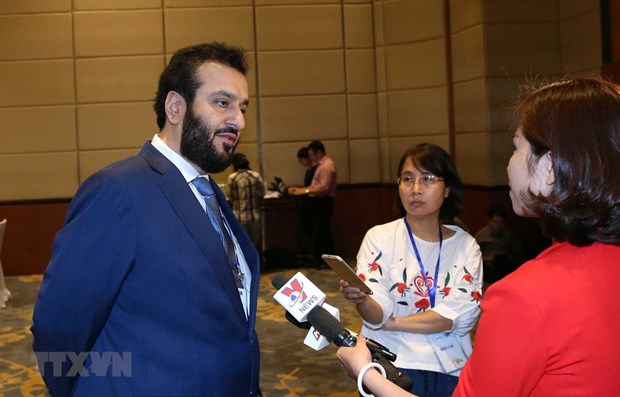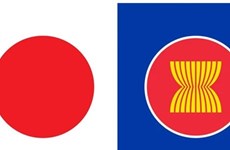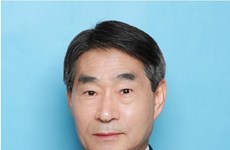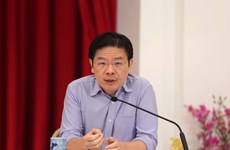OANA 44: Fighting fake news an important task for news agencies
Given the context of the widespread development of fake news causing negative effects on society, members of the Organisation of Asia-Pacific News Agencies (OANA) have underlined the importance of taking drastic measures to deal with the issue.
 WAM Executive Director Mohamed Alrayssi (L) in an interview (Photo: VNA)
WAM Executive Director Mohamed Alrayssi (L) in an interview (Photo: VNA) Hanoi (VNA) –
Given the context of the widespread development of fake news causing negative
effects on society, members of the Organisation of Asia-Pacific News Agencies
(OANA) have underlined the importance of taking drastic measures to deal with the
issue.
Mohamed Alrayssi, Executive Director of the Emirates News Agency (WAM), advised news agencies to increase speed and accuracy in order to better inform the public, thus helping boost their trust in the news sources.
He shared that WAM conducts annual surveys to see how much trust readers hold in it, as well as tries to publish news faster and answer all questions that audiences are looking for in the news so as to build up the agency’s relationship with the public.
Nur Cahya Aryani, head of the International News Division under Indonesia’s ANTARA news agency, said that combating fake news is one of the most important tasks of a news agency, while orienting public opinion is also part of its responsibilities.
According to the Indonesian news agency representative, to meet public demand for mainstream news, ANTARA has established a truth verification department of 10 members to deal with fake news. Its mission is to verify unregulated news that is spreading among various platforms, especially on social networks.
Editor-in-Chief of the Australia Associated Press (AAP) Tony Gilles emphasised that in an environment where there is so much opinion guising as news and information, it is now more important than ever for trusted news sources to stand out.
The AAP has established a fact-checking service which it has made available on all media and is published it on its website, Apple News, Facebook, and Google News. In this service, the AAP verifies claims made by public figures, such as politicians, and can check what has been claimed and declare it either true of false, thus helping enhance the trust in the AAP generally and reinforces its brand values, he added.
Meanwhile, Lee Dong-min from the Yonhap News of the Republic of Korea said fake news is becoming a very big issue in her country.
To fight fake news, Yonhap News temporarily set up a fact-checking team for the presidential election in 2017, going on to make it a permanent team as part of the newsroom in March 2018, she said. Their job is to select items – three or four per week on average – and conduct in-depth fact checking, especially for statements by people with great influence.
According to her, people these days do not rely only on newspapers, news agencies, and TV news to get their information, but are more heavily interested in social networking services. The lack of a respected institution or mediator to verify the information is partly why the spread of news, especially fake news, cannot be controlled so easily on these platforms.
Therefore, as a responsible member of the media, news agencies have to find solutions so that false news can be flagged, checked, verified, and corrected in a timely fashion.
OANA President Aslan Aslanov, who is also Chairman of the Board of the Azerbaijan State News Agency (AZERTAC), said that the issue of fake news was brought to the table for discussion at the 44th OANA Executive Board Meeting.
He stressed that fake news creates a lot of problems for nations and, in particular, international relations between countries. The extent of its damage can even lead to conflicts between countries.
Therefore, the AZERTAC is doing its best to combat the production of fake news and the spread of fake news.
Karel Petrak – project manager of Sourcefabric, Europe’s largest developer of open source software for news media that powers news and media organisations around the world – said that if the firm’s news agency consumers want to use a system to deal with fake news, Sourcefabric can build software to detect fake news by integrating existing tools with simple operating methods, like a spelling checker for journalists. –VNA
Mohamed Alrayssi, Executive Director of the Emirates News Agency (WAM), advised news agencies to increase speed and accuracy in order to better inform the public, thus helping boost their trust in the news sources.
He shared that WAM conducts annual surveys to see how much trust readers hold in it, as well as tries to publish news faster and answer all questions that audiences are looking for in the news so as to build up the agency’s relationship with the public.
Nur Cahya Aryani, head of the International News Division under Indonesia’s ANTARA news agency, said that combating fake news is one of the most important tasks of a news agency, while orienting public opinion is also part of its responsibilities.
According to the Indonesian news agency representative, to meet public demand for mainstream news, ANTARA has established a truth verification department of 10 members to deal with fake news. Its mission is to verify unregulated news that is spreading among various platforms, especially on social networks.
Editor-in-Chief of the Australia Associated Press (AAP) Tony Gilles emphasised that in an environment where there is so much opinion guising as news and information, it is now more important than ever for trusted news sources to stand out.
The AAP has established a fact-checking service which it has made available on all media and is published it on its website, Apple News, Facebook, and Google News. In this service, the AAP verifies claims made by public figures, such as politicians, and can check what has been claimed and declare it either true of false, thus helping enhance the trust in the AAP generally and reinforces its brand values, he added.
Meanwhile, Lee Dong-min from the Yonhap News of the Republic of Korea said fake news is becoming a very big issue in her country.
To fight fake news, Yonhap News temporarily set up a fact-checking team for the presidential election in 2017, going on to make it a permanent team as part of the newsroom in March 2018, she said. Their job is to select items – three or four per week on average – and conduct in-depth fact checking, especially for statements by people with great influence.
According to her, people these days do not rely only on newspapers, news agencies, and TV news to get their information, but are more heavily interested in social networking services. The lack of a respected institution or mediator to verify the information is partly why the spread of news, especially fake news, cannot be controlled so easily on these platforms.
Therefore, as a responsible member of the media, news agencies have to find solutions so that false news can be flagged, checked, verified, and corrected in a timely fashion.
OANA President Aslan Aslanov, who is also Chairman of the Board of the Azerbaijan State News Agency (AZERTAC), said that the issue of fake news was brought to the table for discussion at the 44th OANA Executive Board Meeting.
He stressed that fake news creates a lot of problems for nations and, in particular, international relations between countries. The extent of its damage can even lead to conflicts between countries.
Therefore, the AZERTAC is doing its best to combat the production of fake news and the spread of fake news.
Karel Petrak – project manager of Sourcefabric, Europe’s largest developer of open source software for news media that powers news and media organisations around the world – said that if the firm’s news agency consumers want to use a system to deal with fake news, Sourcefabric can build software to detect fake news by integrating existing tools with simple operating methods, like a spelling checker for journalists. –VNA












